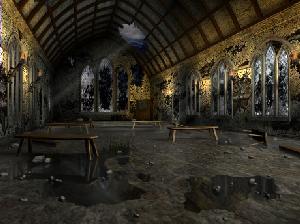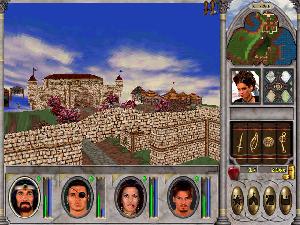No more dice!
Remember 20-sided dice and dungeon-masters? Now that I’ve become a lazy game-reviewer, all those rules and writing have overshadowed the fun of role-playing games. I’m sure millions of nostalgic (and lazy) D&D players out there are dying to get their hands on the perfect D&D computer translation- but so far nothing has been able to emulate the pre-pubescent thrill of slaying dragons and amassing ridiculous wealth (and the demise of the orc-lord Grummish at the hands of my vorpal blade of orc-lord smiting +2 – ed/geek). Might and Magic is one of the forefathers of modern electronic role-playing and has always been one of the better simulations of paper-and-dice. New World Computing’s release of Might and Magic 6: The Mandate of Heaven brings back classic computer role-playing with the convenience of modern technology.
Might and Magic 6 takes place in the world of Enroth where the King, Roland, has mysteriously disappeared. Letters written to his wife documented the days prior to his disappearance. Apparently an army of devil-like creatures has been plaguing the country. In his final letter, Roland is suspicious that a traitor has infiltrated his men and pleads for reinforcements for a hopeless battle with the devils. If that weren’t enough, a cult called the Temple of Baa has been growing in number throughout the kingdom. They seek to undermine the mandate of heaven: the moral order of the universe (the golden rule). It is up to you to muster your courage, form a band of warriors, and save the kingdom of Enroth . . . again.
Anyone who’s played any of the previous Might and Magic games knows that they have stuck to the first-person perspective regime. Though I admit that I prefer the Ultima, overhead style, I, nonetheless, remained optimistic. Those readers familiar with the series will also know that Might and Magic stays very true to the classic paper-and-dice RPGs. You customize your own characters and work to increase their stats and skills. You can also choose your own path, taking on quests in any order. Mandate of Heaven is very much like the original D&D, but much less complicated. Your characters can come from six different classes: fighters, druids, paladins, clerics, archers, and sorcerers (no bards, *sniff*). At the beginning you choose four characters and allocate points to increase their stats and choose skills for them. Once this is done, you are put down in the town of New Sorpigal to buy swanky adventuring duds and begin your quest.
All the previous Might and Magic games have had turn based combat, but part six integrates action and turn based combat. You can choose to fight in real time or in turns. You also see all your enemies around the battlefield; they aren’t all represented as one giant, symbolic, enemy portrait. This was a good idea in general, but the fact that you have four people facing the same direction at all times necessitates the use of turn based combat; otherwise you’ll just get surrounded and killed. Combat has never been easier on the player – just point and click. Thank goodness, because there are plenty of monsters running around.
Exploring Enroth is done with the direction keys and is pretty much like Doom. This is much better than its two-dimensional predecessors. You can actually explore like real adventurers would.

Graphically, Mandate of Heaven is pretty average. All of the monsters and characters are big sprites that look like a gigantic pixilated mess when viewed up close. It’s definitely not as graphically impressive as Final Fantasy 7, but I doubt the designers set out to wow you with fancy graphics. Mandate of Heaven is in the form of a classic role-playing game that emphasizes adventure. So don’t buy this game if you want to see fancy full-motion-video, although there is some.
As I said above, adventure is the strong point of Might and Magic 6. You don’t feel like you’re in some sort of horribly dramatic anime movie like in Final Fantasy 7. You talk to the townspeople at your own leisure, find out about quests, and take them at your own pace. This non-linearity grants you the freedom to explore and just kill a lot of stuff. The drawback is that you can get lost in all the quests that are offered. You might never finish the game because you don’t know what the essential quests are.
Another fun thing about Mandate of Heaven is the huge variety of items and spells at your disposal. There are several types of magic, each having several spells. The weapons are typical of D&D, magic and non-magic. The variety and ability to purchase anything whenever you want (capitalism) is far more realistic than games such as Final Fantasy (communism). There are also several skills to master, such as disarming traps, bargaining, body-building, and diplomacy. All in all, you have tons of freedom in the game.
I didn’t find any huge problems with Mandate of Heaven at all. Everything is done pretty well and it’s a fine addition to the series. What keeps Mandate of Heaven from being excellent is the interaction with the world of Enroth. I love the fact that in Ultima (not the online version – ed.), everything is real. Random villagers have daily tasks and you can follow them around and bother them, until nightfall, when they go to bed. In Mandate of Heaven, villagers walk around for 24 hours and all the dwellings are accessed by menus. The game could be worlds better if you felt that you were immersed more in the environment.
Overall, the traditional style of the game and the focus on gameplay rather than graphics are commendable. Mandate of Heaven is a good game that will keep you busy and interested for hours on end. Fans of real RPGs will have a blast, but casual RPG players might be turned off by the lack of direction. I enjoy playing the game but it definitely could be improved upon. A must buy for fans of the series.
-
+ Gameplay oriented
-
+ Non-linear
-
- Environment needs more realism
-
Sixth time's the charm!
-
Alas, poor Grummish, I knew him well.











